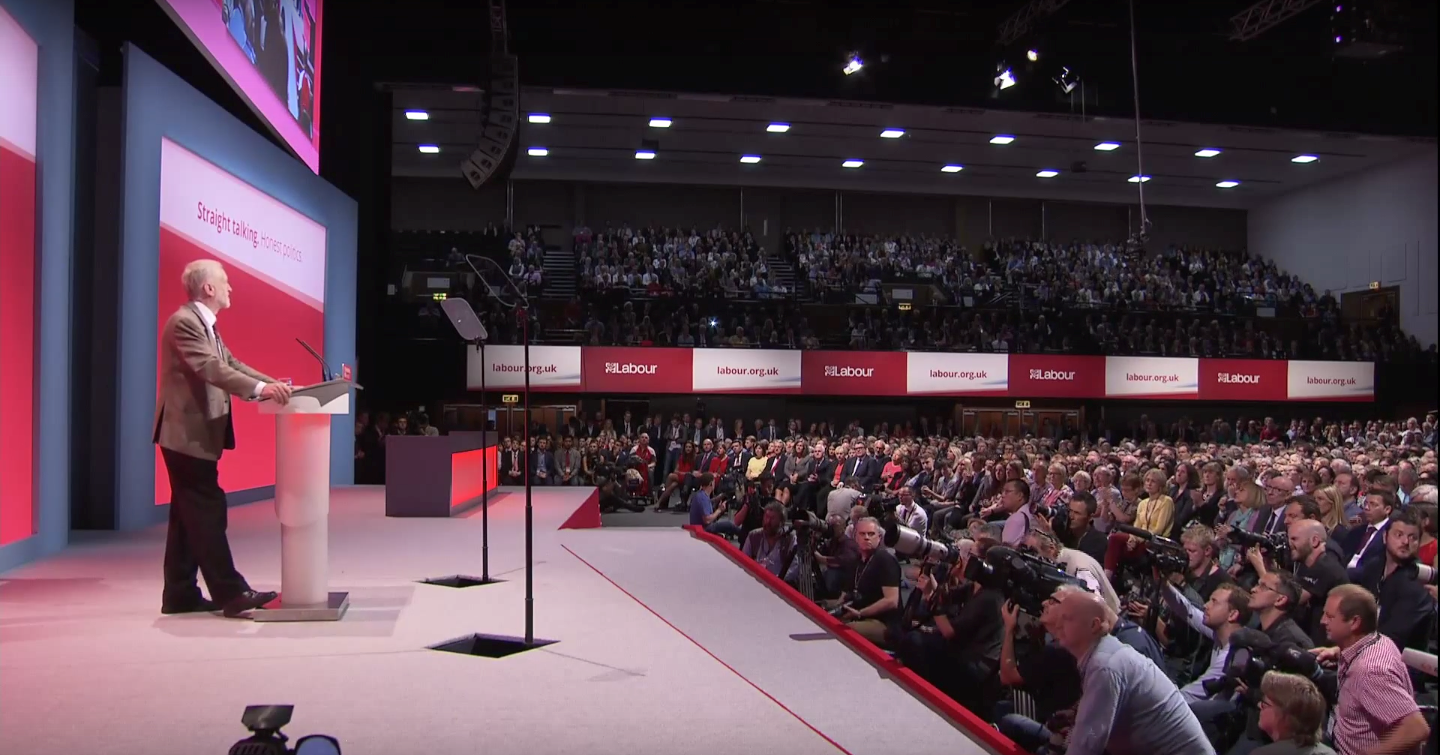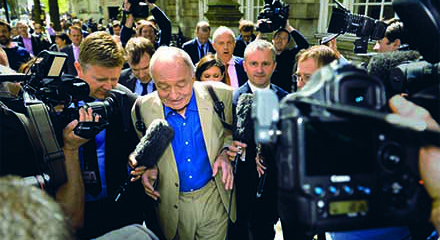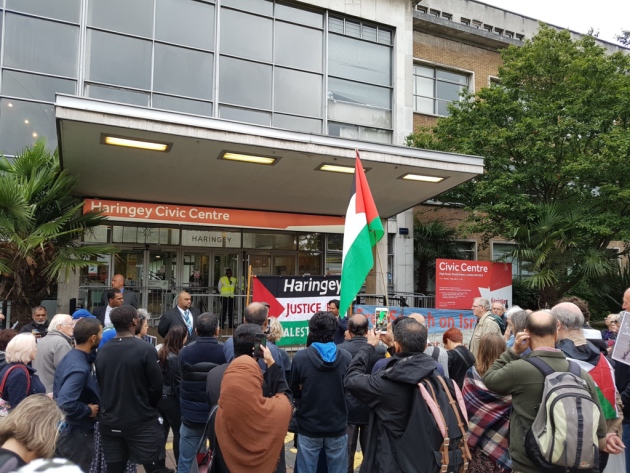Progress, the Jewish Labour Movement and the rightwing media have been running a completely cynical campaign, argues Moshé Machover
The whole campaign of equating opposition to Zionism with anti-Semitism has, in fact, been carefully orchestrated with the help of the Israeli government and the far right in the United States. It is easy to explain why.
Over recent years there has been a shift in public opinion regarding Israeli policy and the conflict in the Middle East and the legitimation or otherwise of Israel as a Zionist, colonising state. One factor behind this shift has been the campaign for boycott, divestment and sanctions. When the BDS campaign was very young there was some discussion about whether it could actually overthrow the Zionist regime – just as some people thought a boycott of South Africa could overthrow apartheid. Of course, all analogies between South Africa and Israel are misleading, because they represent two different models of colonisation. But, leaving that aside, while sanctions may help to produce favourable conditions, those who think they are going to overthrow the regime in this way are deluding themselves.
The BDS campaign has, however, been a mobiliser of public opinion. Its advantage is that in various trade unions and professional organisations, in every college and university, there is a group of people campaigning, and this has provoked a very useful debate about the Israeli-Palestinian conflict. What is remarkable is that among the BDS activists there is an overrepresentation of young Jewish people.
That is very worrying for the Zionists and if you read the Israeli press it is clear that there is a determination to halt this erosion of support for the Zionist state by discrediting its critics. This was the situation before there was even a hint that Jeremy Corbyn could become Labour leader. Of course, his election has added to worries, because for the first time ever a leader of the main opposition party in Britain is someone who has a long record of supporting the Palestinian struggle.
And so the Zionists and all their allies decided to launch their ‘Anti-Zionism equals anti-Semitism’ campaign. Accidentally or not, the current Israeli ambassador to London is a certain Mark Regev, who has consistently justified Israel’s crimes. Regev is hardly a normal diplomat – he is a propagandist by trade. And, of course, the ‘Anti-Zionism equals anti-Semitism’ campaign has been taken up by those who have no particular pro-Israel sentiments, but are looking for ways to attack the left of the Labour Party.
So there is now a coalition between, on the one side, people worried about the rise in support for the Palestinian cause and who would like to discredit the Labour left for that reason; and, on the other, people like the vile blogger, Guido Fawkes, whose real name is Paul Staines – a rightwinger who would do anything to discredit the Labour left. He is using ‘anti-Semitism’ smears for opportunistic reasons, not because he really cares one way or the other about Israel/Palestine.
The campaign has been remarkably successful and, of course, the biggest scalp so far is that of former London mayor and former NEC member, Ken Livingstone. What did he say that got him suspended? Hitler came to power in 1932 and “supported Zionism until he went mad”. Of course, he got the date wrong, Hitler came to power in 1933. It was also wrong to personalise the shift in policy. But the point he was making about the Nazi regime and Zionism is basically correct, as I shall demonstrate.
Don’t mention Zionism
How should the left react under such circumstances? A good friend of mine, who is on the left and has been a co-signatory of some of the statements we have been issuing, said to me that maybe we should not talk too much about Zionism, because people do not understand it and can get confused. Maybe we should just concentrate on the actual evils carried out by Israel.
You will not be surprised to learn that this person belongs to that part of the left which is happy to talk about austerity, but does not want to mention capitalism. Everyone understands austerity and it is good to organise demonstrations against it, but ‘capitalism’ is too much of a political word.
I fail to see how dropping mention of Zionism can work. Even the Zionists acknowledge that it is acceptable to criticise Israeli policy and would not be too concerned if we criticised, say, Israel’s continuing colonisation – building settlements on the West Bank and so on. But I ask a question: why does Israel persist in this? It is a policy which earns it the most criticism in the United States. Barack Obama and Bernie Sanders have criticised it directly and the British government’s official policy is that these settlements are ‘illegal’ – they are an ‘obstacle to peace’, etc. So why does Israel do it? How can you explain it?
It can be explained by the fact that it is an essential part of Zionist policy. In carrying out this policy Israel is, if you like, following an imperative of Zionism from the very beginning. Once you accept that this is an integral part of Zionism, then you realise it would be strange if Israel did not attempt to implement it. It is not as if it were a policy specific to the current government of Binyamin Netanyahu. It has been carried out by all Israeli governments since 1967 and it took place within the former borders – the so-called ‘green line’ – before 1967. It has been an ongoing policy of Zionist colonisation from the very beginning.
You cannot explain why Israel is continuing with a policy that is not winning it any friends without mentioning Zionism. On the contrary, I think what we should do is not apologise; instead we should go onto the offensive and be aggressive: directly attack Zionism.
And you can also attack Zionism precisely because of its collusion and collaboration with anti-Semitism, including up to a point with Nazi Germany. We should not respond to the attacks by saying, ‘We are against anti-Semitism, as we are against all racism’, which is to accept that anti-Semitism is actually a problem on the left. While, of course, we oppose such racism, the fact is that its proponents within the left and the Labour Party account for a minuscule proportion. We can deal with anti-Semitism if it shows its head, but we should not make gestures as a kind of apology in the face of the current assault. The handful of people on the left who propagate a version of the ‘Protocols of the Elders of Zion’ carry no weight and are without any intellectual foundation.
The Protocols contained claims of both capitalist and working class conspiracy: Jews were ‘overrepresented’ among capitalists, but they were also ‘overrepresented’ in the revolutionary movement. The anti-Semitic slogan in revolutionary Russia was: “Sugar – Brodsky, tea – Vissotsky, Russia – Trotsky” – the first two were magnates and all three were Jews. We can deal with similar nonsense on the left in our own time, but not as an apology in response to attacks on the left. On the contrary, we need to go on the counteroffensive.
Link
We should take the side of the Board of Deputies of British Jews – not the current one, but the Board of Deputies of 100 years ago! It put out some very pertinent statements about Zionism and its connection with anti-Semitism. When the negotiations on the 1917 Balfour Declaration were taking place, a prominent member of the Board of Deputies, Lucien Wolf, wrote:
I understand … that the Zionists do not merely propose to form and establish a Jewish nationality in Palestine, but that they claim all the Jews as forming at the present moment a separate and dispossessed nationality, for which it is necessary to find an organic political centre, because they are and must always be aliens in the lands in which they now dwell, and, more especially, because it is “an absolute self-delusion” to believe that any Jew can be at once “English by nationality and Jewish by faith”.
I have spent most of my life in combating these very doctrines, when presented to me in the form of anti-Semitism, and I can only regard them as the more dangerous when they come to me in the guise of Zionism. They constitute a capitulation to our enemies, which has absolutely no justification in history, ethnology or the facts of everyday life, and if they were admitted by the Jewish people as a whole, the result would only be that the terrible situation of our co-religionists in Russia and Romania would become the common lot of Jewry throughout the world.1)Reproduced in B Destani (ed) The Zionist movement and the foundation of Israel 1839-1972 Cambridge 2004, Vol 1, p727
About the same time, Alexander Montefiore, president of the Board of Deputies, and Claude, his brother, who was president of the closely associated Anglo-Jewish Association, wrote a letter to The Times. They stated that the “establishment of a Jewish nationality in Palestine, founded on the theory of Jewish homelessness, must have the effect throughout the world of stamping the Jews as strangers in their native lands and of undermining their hard-won positions as citizens and nationals of those lands”.2)The Times May 24 1917
They pointed out that the theories of political Zionism undermined the religious basis of Jewry, to which the only alternative would be “a secular Jewish nationality, recruited on some loose and obscure principle of race and of ethnographic peculiarity”.
They went on:
But this would not be Jewish in any spiritual sense, and its establishment in Palestine would be a denial of all the ideals and hopes by which the survival of Jewish life in that country commends itself to the Jewish conscience and Jewish sympathy. On these grounds the Conjoint Committee of the Board of Deputies and the Anglo-Jewish Association deprecates earnestly the national proposals of the Zionists.
The second part in the Zionist programme which has aroused the misgivings of the Conjoint Committee is the proposal to invest the Jewish settlers [in Palestine] with certain special rights in excess of those enjoyed by the rest of the population …
In all the countries in which Jews live the principle of equal rights for all religious denominations is vital to them. Were they to set an example in Palestine of disregarding this principle, they would convict themselves of having appealed to it for purely selfish motives. In the countries in which they are still struggling for equal rights they would find themselves hopelessly compromised … The proposal is the more inadmissible because the Jews are and probably long will remain a minority of the population of Palestine, and might involve them in the bitterest feuds with their neighbours of other races and religions, which would severely retard their progress and find deplorable echoes throughout the orient.3)See www.godlikeproductions.com/forum1/message55570/pg1
This turned out to be highly prophetic.
Nazi collaboration
Let us turn now to the Zionist-Nazi connection. In fact it sounds more shocking than it is, because we are talking about the early days of the Nazi regime. Today the holocaust is taught in schools, so people may know when the policy of extermination of Jews actually started officially – in January 1942, when a Nazi conference was convened in Wannsee under the chairmanship of Reinhard Heydrich. Heydrich was second in command to Heinrich Himmler, the head of the SS.
The minutes of this conference are actually online and in them a change in policy towards the Jews, ratified by the Führer, was declared. Although it is phrased euphemistically, it is clear that what was being talked about was both deportation to the east and extermination.
This change occurred following the attack on the Soviet Union, when the Nazis felt they had to find different ways of dealing with the ‘Jewish problem’. Until that time the official policy was for the exclusion of the Jews from political and civic life, for separation and for emigration. Quite naturally the Zionist leadership thought this set of policies was similar to those of other anti-Semitic regimes – which it was – and the Zionist approach was not peculiar to the Nazi regime. The founder of political Zionism, Theodor Herzl, had pointed out that anti-Semitic regimes would be allies, because they wanted to get rid of the Jews, while the Zionists wanted to rid them of the Jews. That was the common interest.
In 1934 the German rabbi, Joachim Prinz, published a book entitled Wir Juden (‘We, the Jews’), in which he welcomed the Nazi regime. That regime wanted to separate Jews from non-Jews and prevent assimilation – as did the Zionists. Philip Roth’s novel, The plot against America, is based on actual people, including Prinz, who emigrated to America and became a leader of the US Jewish community – the fact that he was a Zionist is not mentioned.
Anyway, the Zionists made overtures to the Nazi regime, so how did the Nazis respond? Here are two relevant quotations. The first is from the introduction to the Nuremberg laws, the racist legislation introduced in Nazi Germany in 1935. This extract was still present in the 1939 edition, from which I am quoting:
If the Jews had a state of their own, in which the bulk of their people were at home, the Jewish question could already be considered solved today … The ardent Zionists of all people have objected least of all to the basic ideas of the Nuremberg laws, because they know that these laws are the only correct solution for the Jewish people too …4)See M Machover and M Offenberg Zionism and its scarecrows London 1978, p38, which directly quotes Die Nürnberger Gesetze. See also F Nicosia The Third Reich and the Palestine question London 1985, p53; and FR Nicosia Zionism and anti-Semitism in Nazi Germany Cambridge 2008, p108.The latter cites a 1935 article by Bernhard Lohsener in the Nazi journal Reichsverwaltungsblatt
Heydrich himself wrote the following in an article for the SS house journal Das Schwarze Korps in September 1935:
National socialism has no intention of attacking the Jewish people in any way. On the contrary, the recognition of Jewry as a racial community based on blood, and not as a religious one, leads the German government to guarantee the racial separateness of this community without any limitations. The government finds itself in complete agreement with the great spiritual movement within Jewry itself, so-called Zionism, with its recognition of the solidarity of Jewry throughout the world and the rejection of all assimilationist ideas. On this basis, Germany undertakes measures that will surely play a significant role in the future in the handling of the Jewish problem around the world.5)Das Schwarze Korps September 26 1935
In other words, a friendly mention of Zionism, indicating an area of basic agreement it shared with Nazism.
Of course, looking back at all this, it seems all the more sinister, since we know that the story ended with the gas chambers a few years later. This overlap is an indictment of Zionism, but the actual collaboration between the two was not such an exceptional thing, when you accept that the Zionists were faced with the reality of an anti-Semitic regime.
By the way, half of what Ken Livingstone said is not very far from the caricature uttered by Netanyahu in 2016 during an address to delegates at the World Zionist Congress in Jerusalem. According to Netanyahu, “Hitler didn’t want to exterminate the Jews” until he met the grand mufti of Jerusalem, Hajj Amin al-Husseini, in 1941. Netanyahu claimed that “Al-Husseini went to Hitler and said, ‘If you expel them, they’ll all come here’.”
Of course, the allegation that the idea of extermination originated with the grand mufti has been rejected with contempt by serious historians, but Netanyahu was at least correct in saying that emigration, not extermination, was indeed Nazi policy until the winter of 1941-42.
Let me repeat: we must go on the counterattack against the current slurs. It is correct to expose Zionism as a movement based on both colonisation and collusion with anti-Semitism. Don’t apologise for saying this. If you throw the sharks bloodied meat, they will only come back for more. At the moment the left is apologising too much, in the hope that the right will let up. They never will.
References
| ↑1 | Reproduced in B Destani (ed) The Zionist movement and the foundation of Israel 1839-1972 Cambridge 2004, Vol 1, p727 |
|---|---|
| ↑2 | The Times May 24 1917 |
| ↑3 | See www.godlikeproductions.com/forum1/message55570/pg1 |
| ↑4 | See M Machover and M Offenberg Zionism and its scarecrows London 1978, p38, which directly quotes Die Nürnberger Gesetze. See also F Nicosia The Third Reich and the Palestine question London 1985, p53; and FR Nicosia Zionism and anti-Semitism in Nazi Germany Cambridge 2008, p108.The latter cites a 1935 article by Bernhard Lohsener in the Nazi journal Reichsverwaltungsblatt |
| ↑5 | Das Schwarze Korps September 26 1935 |







